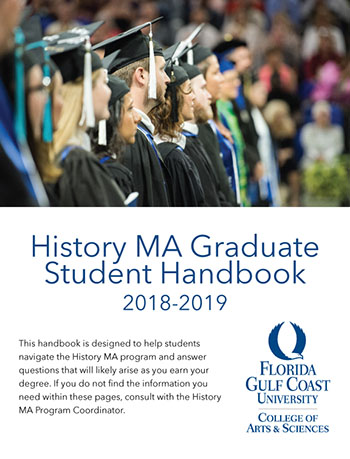History MA
The MA in History at Florida Gulf Coast University offers students a well-rounded and flexible academic program.
The degree emphasizes the research, writing, and professional development skills needed to succeed in teaching (K-12 through State College levels), public history (museum administration, archives, government offices, etc), and PhD programs in History or related fields.
Program Requirements full-time/part-time options financial aid/assistantships
Advancing your Teaching Career
 FGCU’s MA in History offers a flexible and convenient MA for Educators in Southwest
Florida. Educators benefit from evening and summer courses, the opportunity to receive
merit-based tuition waivers, and a wide variety of courses to meet individual needs
and interests. Equipped with an MA in History, our alumni are flourishing as teachers
and educational leaders in Lee County, Collier County, and beyond.
FGCU’s MA in History offers a flexible and convenient MA for Educators in Southwest
Florida. Educators benefit from evening and summer courses, the opportunity to receive
merit-based tuition waivers, and a wide variety of courses to meet individual needs
and interests. Equipped with an MA in History, our alumni are flourishing as teachers
and educational leaders in Lee County, Collier County, and beyond.
Preparing for Graduate School
 FGCU’s MA in History can serve as a starting point for further graduate study. Our
alumni have been accepted to master’s and PhD programs at academic institutions such
as the University of Maryland, Western Michigan University, Northern Arizona University,
and the University of Alabama.
FGCU’s MA in History can serve as a starting point for further graduate study. Our
alumni have been accepted to master’s and PhD programs at academic institutions such
as the University of Maryland, Western Michigan University, Northern Arizona University,
and the University of Alabama.
The American Historical Association provides resources for students who are considering graduate study in history:
Public History
 FGCU’s MA in History offers graduate courses in public and oral history. Students
with an interest in public history can complete up to six credit hours in Internship
coursework. Museums and historical sites where FGCU students have worked include the
Edison and Ford Winter Estates, Burroughs Home and Gardens, and the IMAG History and
Science Center.
FGCU’s MA in History offers graduate courses in public and oral history. Students
with an interest in public history can complete up to six credit hours in Internship
coursework. Museums and historical sites where FGCU students have worked include the
Edison and Ford Winter Estates, Burroughs Home and Gardens, and the IMAG History and
Science Center.-
Application/Admission process
Toggle More InfoHow do I apply for the History MA program?
- Visit the Office of Graduate Studies & Admissions
Do I have to take the GRE? What are the minimum scores required?
- For students with a GPA of 3.0 for the last 60 hours of the BA or BS degree, the GRE is not required. For applicants who do not meet this criterion, a minimum verbal GRE score of 500 (old) or 153 (revised) and a minimum analytical score of 3.5 is required.
If I am an international student, what test must I take? What is the minimum score required?
- If you are an international student from a country where English is not the primary language, you must take the TOEFL. The minimum score required is 550 (paper-based) or 213 (computer-based).
When is the priority deadline for admissions?
- Priority consideration for merit-based financial aid will be given to applicants whose materials have been received in full by February 15 (for Fall admission) or October 15 (for Spring admission).
I understand I need to submit a personal statement of 2-3 pages. What should I write?
- The statement should explain your motivation for pursuing an MA degree, your career goals, and the intended focus of your studies. Specific references to relevant experience or training will strengthen your letter.
Do I need to have a BA in History to apply to the MA program?
- Your undergraduate major can be in any subject, as long as you meet the minimum requirement of at least 15 credits in History (or a related field) from a regionally accredited institution.
How long should my writing sample be?
- The writing sample should be 3,000–5,000 words (i.e., an undergraduate research paper from an upper-level history course).
-
Program FAQs
Toggle More InfoWhich courses are required to complete the 36 hours for the History MA?
- All students must complete at least one of the three professional practice courses: HIS 6004—College-Level Teaching, HIS 6159—Historiography, or HIS 6937—Academic Editing and Writing. For their remaining credit hours, students select appropriate courses from their major field (18 hours maximum), minor field (12 hours maximum), and electives.
How many credits may I transfer in from another university?
- You may transfer a maximum of 9 graduate credit hours from regionally accredited institutions, subject to the approval of the graduate program coordinator.
May I take courses outside of the History program?
- You may take up to 9 elective credits of non-History courses, subject to the approval of the graduate program coordinator.
What does the comprehensive exam require?
- The exam consists of four essay questions, which you must answer in a four hour period. The essays encompass the main historiographical themes and issues in your major and/or minor fields. Exams will be graded by the faculty on your exams committee.
Department Contacts
-
Accreditation
Toggle More InfoInstitutional Accreditation
Information on FGCU institutional accreditation is available at www.fgcu.edu/accreditation
-
Admissions Information
Toggle More InfoGetting Started
Applicants must submit an application online per the individual program’s instructions below. Please contact Graduate Admissions at 239-745-GRAD or graduate@fgcu.edu for additional information about the application process. Satisfaction of minimum University and program requirements does not guarantee admission to a graduate program. Applicants should check with the program for the most up to date admission requirements prior to commencing the application process.
- Submit a completed FGCU Graduate Admissions Application and satisfy all applicable university admissions requirements.
- Earned baccalaureate degree from an institution that maintains accreditation by a U.S. Department of Education sanctioned accrediting body (https://www2.ed.gov/admins/finaid/accred/index.html) or equivalent foreign institution
- At least 15 credits in History from an institution that maintains accreditation by a U.S. Department of Education sanctioned accrediting body (https://www2.ed.gov/admins/finaid/accred/index.html) or equivalent foreign institution with a 3.0 GPA in all History courses.
- A 3.0 GPA for the last 60 hours of the baccalaureate degree (GRE not required). For applicants with less than 3.0 GPA for the last 60 hours of the baccalaureate degree, a minimum verbal GRE score of 500 (old) or 153 (revised) and a minimum analytical score of 3.5.
- International students must demonstrate English language proficiency in accordance with University regulation.
- Two letters of recommendation from past professors or mentors.
- A writing sample of 3,000 words or more.
- Personal statement of interest in pursuing graduate work in history (2-3 pages). The statement should be written in clear, formal academic prose and should explain your motivation in pursuing a Master's degree; your career goals; and the intended focus or specialization of your graduate studies. The letter will be strengthened by specific references to relevant experience or training.
IMPORTANT: If you are interested in taking one or more graduate-level courses without being admitted into a program at this time, please visit the Non Degree-Seeking Student Web site.
-
Program Requirements
Toggle More InfoProgram Requirements for the 2024-2025 Catalog Year
Program Progression and Additional Graduation Requirements
- Students must earn a grade of "B" or better in all graduate-level classes. A grade of B- does not meet this requirement.
- Pursuant to University guidelines, all course work for the degree must be completed within seven years of admission to the program. Extensions may be approved by the History Graduate Program Leader and the Office of Graduate Studies for extenuating circumstances.
- No more than 6 credits of HIS 6905 Directed Readings will be permitted. Additional hours may be permitted under exceptional circumstances with the approval of the History Graduate Program Leader.
- Students may take a maximum of 9 credits of cross-listed (undergraduate and graduate combined) courses.
- Students who have taken HIS 6971 Master's Thesis while pursuing the Thesis Option, and then change to the Non-Thesis Option may apply up to 6 credits of HIS 6971 to the appropriate Field of Study requirements with the approval of the History Graduate Program Leader.
- Graduate students may not take undergraduate courses for graduate credit.
- Graduate students must complete HIS 6004 before they can serve as Teaching Assistants.
- A maximum of 9 graduate credits may be transferred from an institution that maintains accreditation by a U.S. Department of Education sanctioned accrediting body (https://www2.ed.gov/admins/finaid/accred/index.html) or equivalent foreign institution.
- Students must register for a minimum of one credit during the semester in which they apply for graduation.
- Earn more than 50% of the credits toward the degree through FGCU.
- Submit an application for graduation by the semester deadline listed in the FGCU Academic Calendar.
Program Requirements
- Professional Practice (3 credits)
Select one of the following:
HIS 6004 College-Level Teaching (3)
HIS 6159 Historiography (3)
HIS 6937 Academic Writing and Editing (3)
Additional professional practice courses may be taken to fulfill other program requirements in the appropriate field of study. - Thesis or Non-Thesis (33 credits)
Complete one of the following options. All courses must be selected in consultation with the faculty advisor.- Thesis Option
- Complete 18 credits in the thesis field of study, to include 6 credits of HIS 6971 Master's Thesis.
- Complete 6 credits in the non-thesis field of study.
- Complete 9 credits of elective courses at the 5000 level and above.*
- Thesis: Students will, under the supervision of a faculty advisor, complete a thesis in one of the fields of study below. Students are required to complete and defend the thesis and submit one electronic copy of the completed thesis to ProQuest. The production and style of these will follow established university guidelines.
- Non-Thesis Option
- Complete 33 credits of graduate level (5000 and above)* courses. A maximum of 18 credits can be selected from any one field of study.
- Take and successfully defend a comprehensive exam.
*A maximum of 9 credits of courses from outside of the History program may be substituted with the approval of the History Graduate Program Leader.
- Thesis Option
- Fields of Study
In consultation with a faculty advisor, students will select appropriate courses from three fields of study: U.S. History; State, Local, and Public History; and World History. The specific courses selected will depend on student interests, career goals, and selection of thesis or non-thesis option. Courses selected for the thesis field will serve as the foundation for development of the thesis.
US History Courses
AMH 6116 American Colonial Hist (3)
AMH 6176 Civil War and Reconstruction (3)
AMH 6278 U.S. in the Cold War (3)
AMH 6424 Modern Florida (3)
AMH 6516 American Diplomatic History (3)
AMH 6535 American Immigration History (3)
AMH 6546 American Military History (3)
AMH 6567 Women in American History (3)
AMH 6576 African-Amer Hist to 1865 (3)
AMH 6577 African-Ameri Hist since 1865 (3)
AMH 6915 Research in American History (3)*
AMH 6939 Seminar in American History (3)*
HIS 5930 Special Topics (3)*
HIS 6905 Directed Readings (1-3)
HIS 6966 Comprehensive Exam (3)
HIS 6971 Master's Thesis (1-3)
State, Local and Public History Courses
HIS 5930 Special Topics (3)*
HIS 5941 Internship in History (1-3)
HIS 6067 Public History (3)
HIS 6077 Oral History (3)
HIS 6093 How Societies Remember (3)
HIS 6156 Material Culture (3)
HIS 6905 Directed Readings (1-3)*
HIS 6915 Research Public History (3)
HIS 6939 Seminar in Public History (3)
HIS 6966 Comprehensive Exam (3)
HIS 6971 Master's Thesis (1-3)
World History Courses
AFH 6256 Africa in World History (3)
EUH 6126 Readings in Medieval History (3)
EUH 6184 Medieval Ecclesiology and Law (3)
EUH 6249 Themes in Holocaust History (3)
EUH 6517 Tudor and Stuart Britain (3)
EUH 6939 Seminar in European History (3)
HIS 5930 Special Topics (3)*
HIS 6905 Directed Readings (1-3)*
HIS 6966 Comprehensive Exam (3)
HIS 6971 Master's Thesis (1-3)
LAH 6137 Colonial Latin America (3)
LAH 6306 Modern Latin America (3)
LAH 6939 Seminar Lat Am Hist (3)
WOH 6201 Environmental History (3)
WOH 6207 Age of Discovery (3)
WOH 6247 Century of Global Conflict (3)
WOH 6265 Making of the Global Order (3)
WOH 6939 Seminar in World History (3)
Other graduate courses with the prefixes AFH, ASH, EUH, LAH, and WOH
*With appropriate topicTotal Credits Required: 36 HRS
-
Course Descriptions
Toggle More InfoOfficial Course Descriptions
Search for official course descriptions by using the Course Description Search utility.
Go to the Course Descriptions Search Web page, then follow these steps:
- Select an Academic Year from the TERM dropdown (required)
- Select a course prefix from one of the SUBJECT dropdowns (required)
- Enter search words in the TEXT field (optional, but will narrow the search results)
- Press Search
-
Course Schedule
Toggle More InfoGetting started with the Course Schedule Search
Search for program courses by using the Course Schedule Search utility.
Go to the Course Schedule Search Web page, then follow these steps:
- Select an Academic Year from the TERM dropdown (required)
- Select one or more of the search options to narrow your results (for example, CAMPUS, COLLEGE, DEPARTMENT, LEVEL, PREFIX*, COURSE ATTRIBUTE**). For virtual or web courses, select VIRTUAL in the CAMPUS field.
- Press Search.
*A course prefix is a three-letter designator for a major division of an academic discipline (for example, ACG for Accounting , BSC for Biological Science, ENC for English Composition). See the Degree Requirements page for a list of courses (with prefix and number) that can be used to fulfill degree requirements.
**A course attribute identifies specific characteristics of courses that can be used in a Degree Evaluation to satisfy a degree requirement. (Course attribute examples are Humanities courses - GEHM and Social Science courses - GESO.)
-
Learning Outcomes
Toggle More InfoHistory M.A.
Academic Learning Compact
Consistent with its mission and guiding principles, Florida Gulf Coast University is committed to academic excellence and continuous quality improvement, as supported by a sound teaching-learning process. Within this process, students and instructors share responsibility for learning that is a movement from the simple to the complex, the concrete to the abstract, and the dependent to the independent. The Academic Learning Compact (ALC) initiative supports the teaching-learning process by clearly identifying expected core student learning outcomes; aligning curricula with expectations; and using assessment to guide continuous improvement.MAHist-DIS1 Graduates of the program will be able to express a scholarship-based understanding of key historiographical theories and philosophies, and their application to a variety of historical subject matters.
MAHist-DIS2
Graduates of the program will be able to evaluate and deconstruct a range of historical texts including primary and secondary sources, in a complex manner.MAHist-DIS3
Graduates of the program will be able to conduct advanced historical research and scholarship, using relevant resources and databases that engages with interdisciplinary perspectives, adds to scholarly understanding, provides challenging perspectives, or analyzes various ethical and professional issues.MAHist-DIS4
Graduates of the program will be able to create sophisticated and professionally informed written works and employ prose that is clear and effective.
Learning Outcomes will be assessed in the following courses:MAHist-DIS1 - Express historiographical theories - Discipline Content KnowledgeAMH 6567 - Women in American HistoryHIS 5930 - Special TopicsMAHist-DIS2 - Evaluate historical texts - Discipline Content KnowledgeAMH 6567 - Women in American HistoryHIS 5930 - Special TopicsMAHist-DIS3 - Conduct advanced research - Discipline Content KnowledgeAMH 6567 - Women in American HistoryHIS 5930 - Special TopicsMAHist-DIS4 - Engage historical research - Discipline Content KnowledgeAMH 6567 - Women in American HistoryHIS 5930 - Special Topics -
Tuition, Fees, and Financial Assistance
Toggle More InfoTuition and Fees
Information on Tuition, Fees and estimated total Cost of Attendance is available on the Office of the Bursar web site.
Tuition Waivers
A limited number of tuition waivers, which cover only in-state matriculation fees, are available. These are awarded competitively. To access the application, visit the tuition waiver page.
Graduate Assistantships
A limited number of graduate assistantships are available for full-time students (those enrolled in 9 or more credit hours per semester). These are awarded competitively, and admission into the program does not guarantee a graduate assistantship.
Teaching Assistantships
A limited number of teaching assistantships are available for full-time students who have passed 18 hours of History graduate coursework and who have successfully passed HIS 6004 (College-level teaching). These are awarded competitively; meeting the minimum qualifications does not guarantee a teaching assistantship.
Financial Aid
Visit FGCU's Financial Aid Web site for information about grants, scholarships, loans, and student employment.


